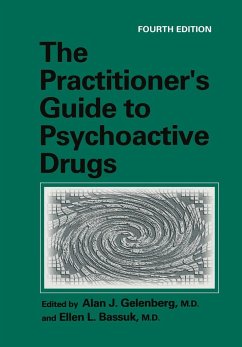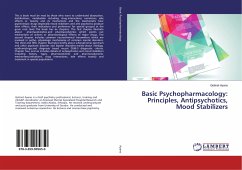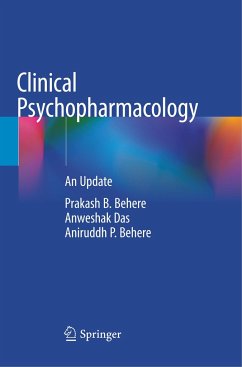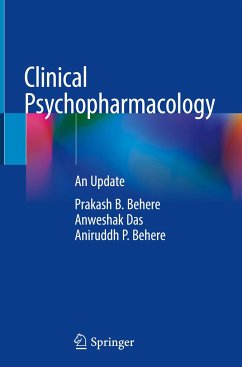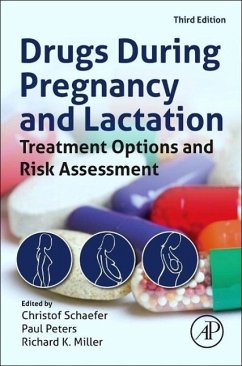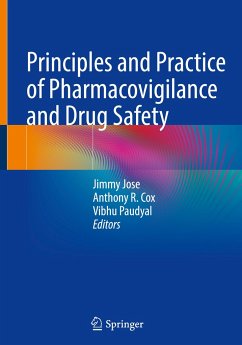
A Practitioner's Guide to Prescribing Antiepileptics and Mood Stabilizers for Adults with Intellectual Disabilities

PAYBACK Punkte
38 °P sammeln!
Emotional, behavioral, and neuropsychiatric conditions are common in individuals with intellectual disabilities (IDs), most notably epilepsy, aggression, self-injurious behaviors, and bipolar and other mood disorders. Despite the prevalence of such problems, there is a scarcity in the literature of reliable information on medical treatments for those with IDs.A Practitioner's Guide to Prescribing Antiepileptics and Mood Stabilizers for Adults with Intellectual Disabilities provides a detailed framework for prescribing for this challenging population. Featuring the most up-to-date information o...
Emotional, behavioral, and neuropsychiatric conditions are common in individuals with intellectual disabilities (IDs), most notably epilepsy, aggression, self-injurious behaviors, and bipolar and other mood disorders. Despite the prevalence of such problems, there is a scarcity in the literature of reliable information on medical treatments for those with IDs.
A Practitioner's Guide to Prescribing Antiepileptics and Mood Stabilizers for Adults with Intellectual Disabilities provides a detailed framework for prescribing for this challenging population. Featuring the most up-to-date information on factors that inform prescribing, the Guide addresses basic issues and controversies (e.g., the rift between evidence-based and personalized medicine) in treating adults with cognitive deficits. Clients' specific needs are emphasized in developing appropriate and effective pharmacological intervention for improved outcomes and quality of life. Drugs discussed in the Guide include carbamazepine, clonazepam, diazepam, ethosuximide, felbamate, gabapentin, lacosamide, lamotrigine, levetiracetam, lithium, lorazepam, oxcarbazepine, phenobarbital, phenytoin, pregabalin, primidone, rufinamide, tiagabine, topiramate, valproate, and zonisamide. For each of these compounds, the guidelines cover:
Indications for use; relative and absolute contraindications.Assessment during treatment; therapeutic drug monitoring; warning signs and symptoms for caretakers.Dosage: administration; initial and maximum recommended dosage; modifications associated with drug-drug interactions, personal characteristics, and (where appropriate) genetic variations.Adverse drug reactions: common, relatively uncommon, and potentially lethal, plus risk of metabolic syndrome.Guidelines for discontinuation.References, tables, and drug utilization reviews.
A Practitioner's Guide to PrescribingAntiepileptics and Mood Stabilizers for Adults with Intellectual Disabilities is an indispensable decision-making reference for psychiatrists, neuropsychologists, psychopharmacologists, neurologists, internists, and clinical psychologists.
A Practitioner's Guide to Prescribing Antiepileptics and Mood Stabilizers for Adults with Intellectual Disabilities provides a detailed framework for prescribing for this challenging population. Featuring the most up-to-date information on factors that inform prescribing, the Guide addresses basic issues and controversies (e.g., the rift between evidence-based and personalized medicine) in treating adults with cognitive deficits. Clients' specific needs are emphasized in developing appropriate and effective pharmacological intervention for improved outcomes and quality of life. Drugs discussed in the Guide include carbamazepine, clonazepam, diazepam, ethosuximide, felbamate, gabapentin, lacosamide, lamotrigine, levetiracetam, lithium, lorazepam, oxcarbazepine, phenobarbital, phenytoin, pregabalin, primidone, rufinamide, tiagabine, topiramate, valproate, and zonisamide. For each of these compounds, the guidelines cover:
Indications for use; relative and absolute contraindications.Assessment during treatment; therapeutic drug monitoring; warning signs and symptoms for caretakers.Dosage: administration; initial and maximum recommended dosage; modifications associated with drug-drug interactions, personal characteristics, and (where appropriate) genetic variations.Adverse drug reactions: common, relatively uncommon, and potentially lethal, plus risk of metabolic syndrome.Guidelines for discontinuation.References, tables, and drug utilization reviews.
A Practitioner's Guide to PrescribingAntiepileptics and Mood Stabilizers for Adults with Intellectual Disabilities is an indispensable decision-making reference for psychiatrists, neuropsychologists, psychopharmacologists, neurologists, internists, and clinical psychologists.




